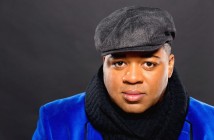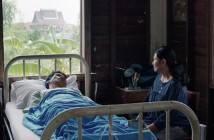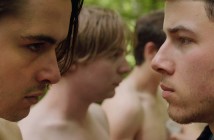Of Monsters and Men: An Interview with Bong Joon-ho
In just a little over a decade, Korean filmmaker Bong Joon-ho has achieved no mean feat: with the most minimal filmography among his filmmaker colleagues with four feature films, he has made his mark as one of the most exciting, articulate, and multifaceted directors not only of his generation but of contemporary world filmmakers today. His visibility in several film festivals in 2011—Sundance and Cannes as a jury member, and most recently Busan West—attests to the international quality of his standing.
Film critics/scholars and fans alike speak highly of and are left breathless by Bong’s ability to take genres and morph them into a whole different beast, but not with the objective of simply setting familiar Hollywood genres in South Korea, with the country as a passive backdrop. Instead, Bong has a wonderful knack for presenting and exploring off-kilter perspectives of underdog stories that are intimately integrated with the specificity of Korean history, situations, and conditions. His ability to mix drama, humor, and sociopolitical jabs at institutions—academia in Barking Dogs Never Bite (2000); the police, military, and the state in Memories of Murder (2003) and The Host (2006), and family in Mother (2009)—is largely unparalleled.
For the remainder of 2011 and 2012, Bong is embarking on a project that is unparalleled in his career: his newest production Le transperceneige, or Snowpiercer, based on the French graphic novel series (1984-2000) of the same title. With this project, as Bong shares below, he perhaps comes closest to what Orson Welles once said about filmmaking being “the greatest electric train set a boy ever had.”
With the exception of Bong’s most recent feature film, Mother (2009), at this year’s Busan West spectators had the great opportunity to see on the big screen all of his films. Bong was in attendance throughout the whole weekend to receive the Busan West Icon Award, present The Host in 3D, give a master class to the film students of Chapman University, and give a Q&A following Memories of Murder. In receiving the Busan West Icon Award, Bong joins his friend and fellow filmmaker Park Chan-wook, who was the recipient of the same award in 2009, the inaugural year of Busan West. Following this festival, Bong will remain in Los Angeles for nearly a week to work on pre-production (casting) for Snowpiercer.
On the morning of the day he was awarded the Busan West Icon Award, Rowena Santos Aquino had the opportunity to speak with director Bong about 3D, short films, what he loves and hates in filmmaking, and his highly anticipated project, Snowpiercer.
Throughout the interview, Bong weaves back and forth between Korean and English. I have denoted the language he used in his responses to maintain the original flow of the conversation.
Interview by Rowena Aquino
Korean translation by Hyongshin Kim
November 11, 2011
Marion Knott Studios, Chapman University, Orange, CA
Rowena Santos Aquino: First of all, congratulations in advance on receiving the Busan West Icon Award.
Bong Joon-ho: Thank you. [Korean] I heard about it in early October in Korea during the Busan International Film Festival and I was pleased.
RSA: You will premiere The Host in 3D in the U.S. What made you decide to make The Host in 3D now?
BJH: [Korean] I have many concerns or dilemma about 3D as a director. Even Martin Scorsese made a 3D recently [Hugo], and I’m very curious about 3D. But personally, I’m not sure about the possibility of 3D and I don’t think 3D is the future of cinema. Personally, I am not fond of 3D. [English] Personally. The production company called Chungeorahm [Film], which produced The Host, they are very good people. The producer [Choi Yong-bae] is also a very challenging man. Now they are preparing the sequel of The Host, with another director. [Korean] Because the sequel will be made in 3D, for the promotion of the sequel, and also for the technical test for 3D, The Host was converted into 3D. Although I don’t like 3D personally, I like the production company very much, so I support what they do, and I support their technical challenges. So I told them “good, please do” and gave them a permission to make it into 3D.
[English] But personally, I was, frankly speaking, very, very curious if they were to make my previous movie into 3D. When I was making it [The Host], I never imagined, I never planned that movie to become 3D. [Korean] Like The Lion King, it is the first time [in South Korea]for a 2D film that already had released to be converted into 3D. But as far as 3D is concerned, Sector 7 was made as a 3D and released during the summer this year, earlier than this film.
RSA: With 3D films and iphone, or mobile, cinema, as in Park Chan-wook’s Nightfishing (2011), where do you see yourself and your filmmaking at this point in time?
BJH: For me, the audience wants a story with striking images, fresh, new images. But there are so many different kinds of ways to make new, striking images. [Korean] I think iphone or 3D, they are one of the various methods to make a new image. However, a story that has enormous, destructive power always exists as the foundation.
RSA: What other media influence you?
BJH: I’m a huge fan of comic books.
I love quite many photographers. For example, I love Sally Mann. Have you ever heard of her? She’s an American female photographer. [Korean] There is the famous photo album Immediate Family [1992], which I like a lot. I was inspired and influenced by that photo album when I was making The Host. [English] She photographed her own family, but the images are very unique and strange. Some image of death, of her own kid, very black-and-white photos, but very beautiful at the same time, a little bit weird and chilling. It was very inspirational for me. There is a sequence in The Host: the girl and little boy in the creature’s den, deep sewer, in the shelter of the creature, they have their faces [covered]with very dirty water. The image of those two kids in that dirty space was much inspired from Sally Mann’s photography. I strongly recommend her. It’s very interesting.
RSA: Is your interest in photography what makes you photograph your actors as a part of pre-production, as you did with Kim Hye-ja for Mother?
BJH: It’s my habit to photograph my own actors with my own camera. It’s not that kind of a serious photo session: just some casual conversation and at the same time me taking pictures [of them]during conversation. I enjoy that kind of process with my actors.




